“When we talk about this race, I'll just round off some of the math: About 27 percent of the vote was nonwhite, [and] about 27 percent of the vote is rural. Now you've got a wash. Now we're fighting over the suburbs.” Jeff Roe, chief strategist for the Youngkin campaign.
Campaign Quick Hits
If the midterms were held today: Looking at the state legislative races in Virginia and New Jersey, voters are leaning toward Republicans by 6 to 7 points, according to our friends at FiveThirtyEight. That means it would be a hefty Republican win across the spectrum if the midterms were today. “If Republicans won every district in the current House map that has a partisan lean redder than D+7, they would flip 47 [House] seats … and flip five [Senate] seats: Arizona, Georgia, Nevada, New Hampshire and Colorado.” Now, of course, that doesn’t mean they will win that many. Candidates matter. The sweet meteor of death could finally make landfall. But as predictions go at this point, it’s as good as any.
But I still think the Senate is a much steeper climb for the GOP. Why? Because of the actual candidates the GOP may be stuck with. From Politico:
Some of them are already facing attacks for domestic and sexual abuse scandals, candidates such as Sean Parnell in Pennsylvania, whose estranged wife claims he assaulted her and their children; former Gov. Eric Greitens in Missouri, who allegedly sexually assaulted his hairdresser and resigned from office mid-term; and Herschel Walker in Georgia, the retired football star whose ex-wife says he threatened to shoot and kill her.
“The thing that is looming is ‘are we going to f--- up recruitment?’” asked one Republican Senate strategist, describing multiple current GOP frontrunners as “ne’er-do-wells.”
Friends don’t let friends rely on unweighted exit polling: Glenn Youngkin won the Latino vote by 12 points, according to exit polling from Associated Press’ VoteCast. Democrat Terry McAuliffe, on the other hand, won the Latino vote by a crushing 34 points, according to Edison Research’s exit polling for the tv networks. That 46-point swing boggles the mind, but it also proves the value (or lack thereof) of unweighted exit polls like these—especially when trying to make definitive pronouncements about a group that equates to roughly 6 percent of Virginia’s registered voters. In this case, when the overall numbers are so low, even reweighting the exit polling data based on what we know about overall voter turnout probably won’t fix the problems here. As Eduardo Gamarra, who polls Latino voters in the United States and throughout Latin America, told Politico, “The fact is, we probably don’t know who won the Hispanic vote or by how much on Tuesday.”
Q&A with the Youngkin team: Ryan Lizza published an interview with Glenn Youngkin’s top strategists Jeff Roe and Kristin Davison in Politico Magazine. At one point, Lizza asks about the “drama around CRT and how you guys used that issue.” Jeff Roe’s answer perfectly encapsulated the difference between how pundits interpreted the outcome versus how operatives saw it on the ground:
“The education piece is what has gotten the national conversation. And we never gave two s---- about what the national conversation was. On MSNBC and CNN and Fox News, at the height of any day, there are about 9 million people watching in prime time. And of those, about 600,000 to 700,000 people in Virginia [are] watching those programs. There's no undecided voters there — zero point zero.”
‘I Blew It’: Patrick Murray, the director of the Monmouth University Polling Institute, had Democratic incumbent Patrick Murphy up 11 points in the New Jersey governor’s race in his last pre-election poll. But instead the race was a virtual dead heat through Election Night and Murphy held on by just 60,000 votes. In an op-ed he published last week, he apologized to both campaigns “because inaccurate public polling can have an impact on fundraising and voter mobilization efforts.” But he also came to a conclusion that I wholeheartedly agree with. Reflecting on the polling failures of the last several cycles, he noted that “If we cannot be certain that these polling misses are anomalies then we have a responsibility to consider whether releasing horse race numbers in close proximity to an election is making a positive or negative contribution to the political discourse.” Yes!
What if education didn’t matter: As much as folks want to talk about education and critical race theory after Youngkin’s win in Virginia, the New Jersey guy ran on taxes and the swing in New Jersey was bigger than Virginia, even if the Republican lost in the end. So how do we explain it? Take these nuggets from the latest USA Today poll with all my usual caveats, but I think they’re onto something:
Nearly half of those surveyed, 46 percent, said Biden has done a worse job as president than they expected, including 16 percent of those who voted for him.
Independents by 7-1 (44 percent to 6 percent) said Biden’s done worse, not better, than they expected.
Nearly two-thirds of Americans, 64 percent, said they didn't want Biden to run for a second term in 2024. That included 28 percent of Democrats.
Fewer people, in fact, were opposed to Trump running for another term at 58 percent. That included 24 percent of Republicans.
The Nevada Democratic Party as a metaphor: President Biden won Nevada by only 2 percentage points in 2020 and Democratic Senator Catherine Cortez Masto’s seat is one of the prime pick-up opportunities if Republicans hope to win back the Senate in 2022. But the intraparty fighting within the Democratic Party is way more interesting at this point.
In 2016, Bernie Sanders’ team “accused party honchos of rigging the state convention that finalized presidential delegates.” In return, the state party leadership—seen as part of former Senate Majority Leader Harry Reid’s political machine—filed a complaint, accusing the Sanders team of “throwing chairs” and “indeed, actual violence.” Just a few months ago, a slate of “uber-progressive Sanders allies” got their revenge and won control of the state party. But before they were able to get their hands on the books, the Reid people transferred $450,000 back to the Democratic Senatorial Campaign Committee (DSCC) and started their own rival state party called Nevada Democratic Victory. The DSCC, in turn, transferred the $450,000 to the new Reid-controlled group, depriving the Sanders state party of the ability to do anything. The state party filed a complaint with the FEC against the state party in exile. The DNC is trying to circumvent both groups to give voter data directly to the campaigns. In short, things aren’t going well for Democrats in Nevada.
New phone, who ‘dis: Biden’s biggest bundlers are cranky. The campaign had at least 800 people who each raised more than $100,000 for the president. But even folks who raised more than $1 million say they haven’t gotten so much as the traditional thank you card or phone call.
According to Shane Goldmacher at the New York Times, “The reception has been so chilly that some donors have started to presume that Mr. Biden is simply not planning to run for re-election in 2024, finding few other reasonable explanations for neglecting a core constituency.”
Three graphics to explain Virginia (courtesy of FiveThirtyEight):
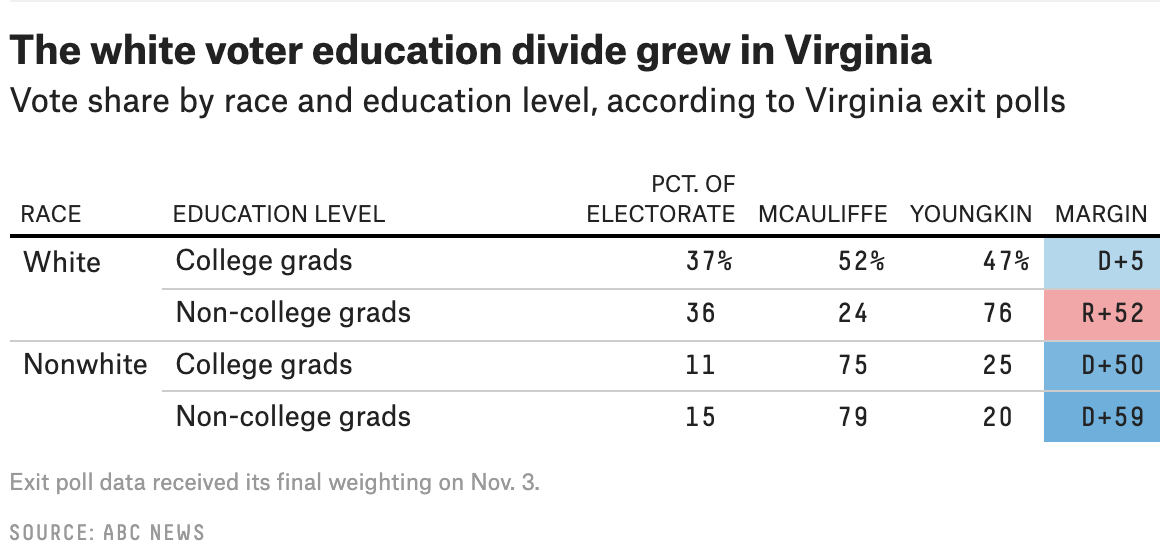
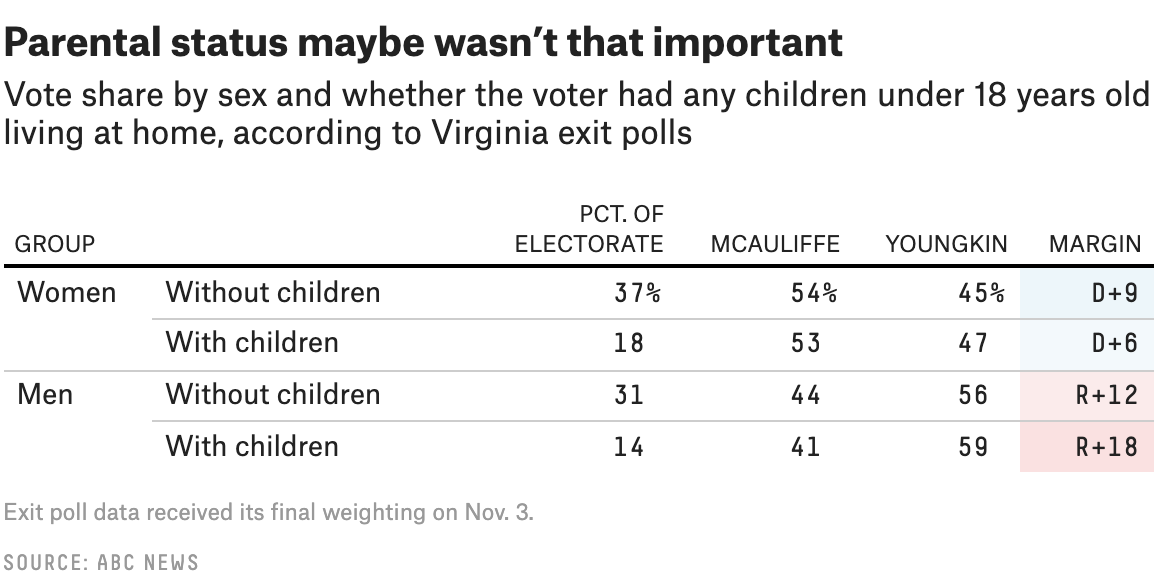
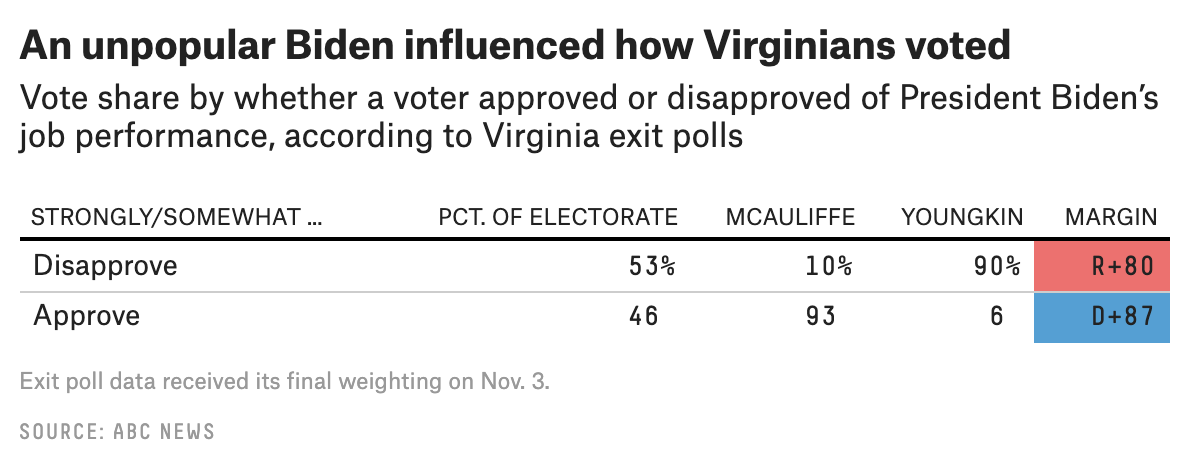
And now, your weekly word from the one, the only (of dozens of others on Facebook) Chris Stirewalt.
With Trump, Hope Is Not a Strategy
There has been an exhausting amount of discussion around the question of how Virginia Gov.-elect Glenn Youngkin “handled” or “dealt with” or kept “at arm’s length” former President Donald Trump. Youngkin’s victory, we were repeatedly told, is a “winning blueprint” for Republicans in the era of Trump’s big sulk.
Yes, but … while Youngkin ran a very good campaign, it wasn’t he who handled Trump, but rather Trump who handled him.
A wave of nausea swept over Virginia Republican politicos at the end of the week before the election. Reports surfaced that Trump was going to hold a rally for Youngkin in, of all places, heavily Democratic Fairfax County. Youngkin’s momentum into the closing days was about to be drowned out by strains of “Tiny Dancer” and Trump’s Festivus litany of grievances. “It was fun while it lasted,” texted one national GOP operative who lives in Virginia and has worked elections in the commonwealth.
It would turn out to be typical Trump flim-flam—just a “tele-rally,” a 10-minute conference call into which his most loyal supporters could dial. But imagine if it had been the real thing. Imagine if Trump had held a big rally in the Washington suburbs, or if he had campaigned across the state. What if he would have used his time as talk radio’s No. 1 caller to start needling Youngkin? It must have been hard for Trump to resist, because the coverage would have been, as he would say, “totally unbelievable.” This intensely watched contest winding down, Democrats on the edges of their seats, and cue DJT. “Blue jean baby, L.A. lady …”
In January, it took Trump weeks to lose two Senate seats in Georgia for Republicans. He had to make repeated trips and squeeze the GOP incumbents so tightly they looked like they had just gotten decked by Georgia Bulldogs linebacker Channing Tindall. But control of the Senate was on the line there. It took extra effort to convince Republican-leaning voters to stay home or switch, but Trump managed. Some poor souls sat out the runoffs believing Trump’s flummery about a stolen election. Others, who didn’t believe Trump, decided that they didn’t want to be a part of or encourage a party that was very obviously losing its damned mind. That was okay with Trump, who pretty clearly wanted to punish Republicans who opposed his botched usurpation or were insufficiently enthusiastic about it.
But he might have wiped out Youngkin’s chances in just a day or two. Trump could have done the anaconda move he did in Georgia, or, if Youngkin had refused to be squeezed, taken the alternate route: direct sabotage. That’s what he’s doing in Georgia’s gubernatorial race, in which he says that progressive heartthrob Stacey Abrams would be a better governor than conservative incumbent Brian Kemp. Trump could have complained on television about Youngkin’s perfidy and disloyalty and told voters, yet again, to stay home. In the blue-hued state of Virginia, a big Trumplosion could have been deadly to the independent support that put Youngkin over the top. Plus, the stakes in Virginia were lower, which would have made it easier for traditional Republicans to bolt or for the mega-MAGA community to sit it out.
So why didn’t he? We don’t know what pressure Youngkin and the GOP donor class may have applied to Trump to keep him away, but at some level, Trump’s absence was an admission that he knew he was a liability. What we don’t know, though, is why he paid attention this time.
Youngkin certainly deserves credit for whatever behind-the-scenes management he did to keep Trump from stealing the limelight in Virginia, but ultimately it was Trump who tried self-control for a change. That was very good news for Republicans last week, but certainly does not represent any kind of a strategy that the party can follow into midterms. In the October NBC News poll, 43 percent of registered Republicans and those who lean toward the GOP said they were more of a supporter of Donald Trump than of the Republican Party—essentially unchanged since January. That means Trump's decisions to play or not play could determine GOP success in all but the reddest states.
Throwing sacrifices into the crater of Trump’s volcanic ego and hoping the lava gods do not destroy your village is not a “blueprint.” With the Senate on the line again next year, Republicans will need something better than relying on Trump’s capacity for self-discipline.
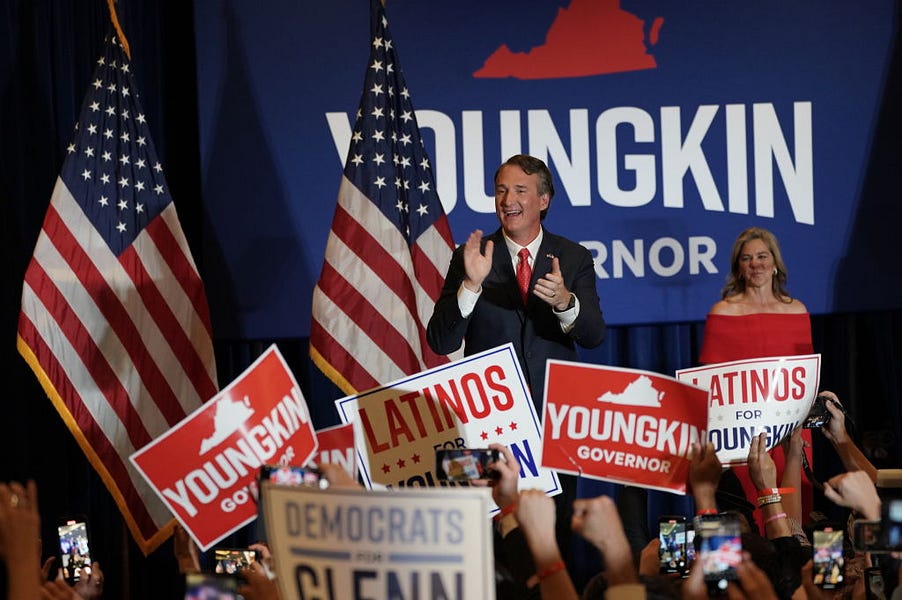






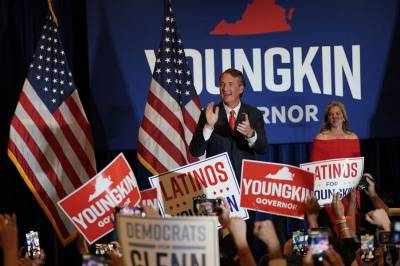
Please note that we at The Dispatch hold ourselves, our work, and our commenters to a higher standard than other places on the internet. We welcome comments that foster genuine debate or discussion—including comments critical of us or our work—but responses that include ad hominem attacks on fellow Dispatch members or are intended to stoke fear and anger may be moderated.
With your membership, you only have the ability to comment on The Morning Dispatch articles. Consider upgrading to join the conversation everywhere.